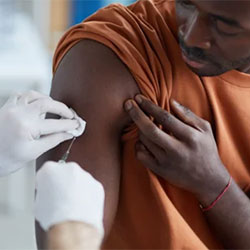By Ethan Covey
The Federal Retail Pharmacy Program (FRPP), a collaboration between the federal government, U.S. states and territories, and 21 national pharmacy chains and independent pharmacy networks, played a crucial role in the administration of bivalent COVID-19 vaccinations during the pandemic.

A CDC report found that from Sept. 1, 2022, through Sept. 30, 2023, approximately 70% of adults across all age groups received their COVID-19 bivalent doses at a federal retail pharmacy, and FRPP partners administered more than 40 million doses of bivalent COVID-19 vaccine (MMWR Morb Mortal Wkly Rep 2024;73[13]:286-290).
“The FRPP was established to ensure broad access to COVID-19 vaccines,” said Nkenge Jones-Jack, PhD, a CDC health scientist and one of the authors of the report. “The FRPP partnership administered two-thirds of all bivalent COVID-19 vaccine doses in the U.S. and provided vaccine access for people across a wide range of sociodemographic groups, demonstrating that this program could serve as a model to provide health services in other public health emergencies.”
The percentage of people receiving COVID-19 vaccines at FRPP sites increased during the pandemic. Previous data showed that from Feb. 11, 2021, to Jan. 31, 2022, only 45% of monovalent doses were administered at FRPP locations.
“FRPP partnerships were critical in ensuring access to bivalent COVID-19 vaccination services across the U.S. and could serve as a model to address vaccination service needs for routine vaccines and during future responses to vaccine-preventable disease emergencies,” Dr. Jones-Jack said. “The partnership with pharmacies, in addition to other vaccine providers, can help to accelerate and ensure equitable vaccine access across the U.S., and address other potential infectious disease–related public health emergencies.”
While the FRPPs were found to have administered large numbers of COVID-19 bivalent doses to most racial and ethnic groups, disparities were observed, including lower proportions of vaccine delivery to American Indian or Alaska Native people.
Dr. Jones-Jack noted that future study may help answer lingering questions regarding racial and ethnic disparities.
“There was a higher number and percentage of records with race and ethnicity reported as unknown within the FRPP data compared with the all-provider data,” she said. “Therefore, the FRPP contribution of bivalent COVID-19 doses administered was likely underestimated for some racial ethnic populations. Further study to understand strategies to support improvements in the collection of race and ethnicity data in pharmacy settings is needed to better support and advance public health practices.”




